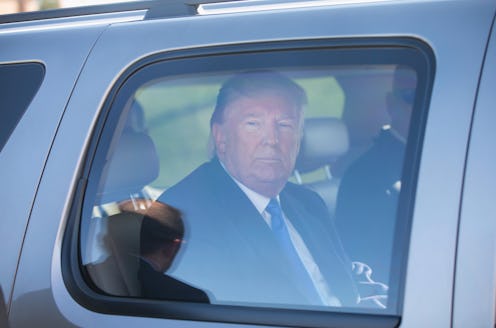News
This Might Be Why Trump Lost Wisconsin
Donald Trump suffered a tough loss to rival Ted Cruz in Wisconsin on Tuesday night, ceding the race by a margin of 13 points and garnering only six delegates statewide. Trump's recent media gaffes — such as his statement on punishment for abortion and the battery charge brought against his campaign manager, Corey Lewandowski — have widely been blamed for the candidate's recent drop in the polls. But it turns out that Wisconsinites may not have really been exposed to those gaffes as much anyway. Joshua Darr, a contributing writer to FiveThirtyEight, launched an investigation of Wisconsin's local media coverage of the Republican frontrunner, and found that Trump was featured on the front page of Wisconsin daily newspapers far less than on national ones. That lack of media coverage, which undermined the business mogul's key campaign strategy, may be the reason Trump lost Wisconsin.
Darr's experiment involved examining the front pages of 16 different Wisconsin daily newspapers from Monday, March 21 to Monday, April 4, sampling their coverage of Trump. While Trump has barely gone a day without being a trending news topic in the national media, Darr found that stories such as "the men’s hockey team at the University of Wisconsin-Stevens Point, high school violinists in Janesville, Wisconsin, and the 'Show Dome' at Milwaukee’s Mitchell Park" all eclipsed Trump for space on various front pages. Coverage picked up when Trump actually came to visit the state on March 29, but fell again once Trump was no longer in the state. He returned to Wisconsin on April 2 and his coverage shot back up again, but he may have overstayed his welcome — by April 4, "the critical day before the primary," his local media coverage plummeted to only one front-page mention.
Darr's experiment seems to indicate that Trump lost the election because of media coverage, or at least that it was a major contribution to the loss. After all, Trump has relied heavily on the media machine to keep himself at the center of attention, and if a town newspaper decides that the local hockey team is a more important story, then Trump's power as a candidate is significantly diminished in that media market. Americans trust their local papers, and many still use them as a primary source of campaign information, so Trump's exclusion from their front pages may have contributed to a tacit distrust of him.
Alternatively, you could argue that the media exposure is the egg rather than the chicken. Perhaps Trump didn't lose because he didn't get local media exposure; maybe he didn't get media exposure because he was never going to win. Darr's investigation didn't compare Trump's exposure to that of the eventual winner, Cruz, so it's unclear whether he was covered more in the papers, correlating local media coverage to election success. But the polling data from before the primary suggests that Wisconsinites were never that interested in Trump to start with, so Trump's dearth of front-page stories may have been a side-effect, rather than the cause, of the loss.
Trump's loss in Wisconsin may not ultimately be relevant to his path to the nomination, but it is definitely an interesting example of the power of local media. Whatever mix of circumstances led to Trump's loss, the election will keep marching forward to Super Tuesday Part Four next week, when Trump might re-surge as the clear frontrunner in this ever-tightening race.
